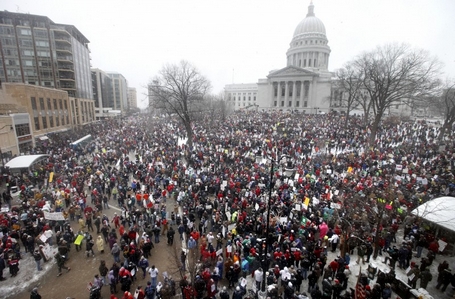The Fall and Rise of WEAC
Once mighty state teachers union has lost its clout, yet many members stick with it.
How the mighty have fallen.
In September 2016, the news broke that the Wisconsin Education Association Council was selling its fancy headquarters on Nob Hill in Madison for $6.9 million. Its 51,000-square-foot building with lovely views of Madison and nearly 40 acres of land housed a huge staff that had helped oversee local teachers groups and shape public policy across Wisconsin.
WEAC was one of the most powerful forces in state elections and unquestionably the top lobbyist. As recently as the 2009-2010 budget period, it had spent $2.49 million on lobbying, about three times more than its top counterpart on the right, Wisconsin Manufacturers and Commerce, which spent nearly $856,000 in that same two-year period.
But then came the election of Scott Walker and a Republican Legislature in 2010, and the passage of Act 10, which decimated collective bargaining rights for all public unions in Wisconsin except the police and fire fighters. No one was hit harder than WEAC.
Before Act 10, WEAC had 98,000 dues paying members; today that number is down to 40,000, as the Wisconsin State Journal has reported.
Before Act 10, WEAC was collecting $23.5 million in annual dues from teachers who were union members, as the Milwaukee Journal Sentinel reported; today that is down to $9.3 million, according to the group’s most recent federal tax form for the 2014/15 year.
Before Act 10, WEAC had a staff of at least 140 employees, but it sent layoff notices to 42 employees not long after the law was passed, the JS reported. Since then the number of staff dropped from 98 in the 2012/13 year to 47 in 2014/15, its federal tax forms show.
GOP Sen. Luther Olsen of Ripon, a key member of the Assembly and then Senate education committees for two decades, told the State Journal that WEAC has no impact now: “Honestly, I never see (WEAC officials) in the Capitol anymore,” he said. “I don’t even know who their lobbyist is.”
WEAC also has lost clout in elections. It spent around $550,000 on TV and radio ads in 2009 to help elect Tony Evers over school voucher proponent Rose Fernandez, as the State Journal noted, but is unlikely to have such money on hand for future elections. Decimating the political power of WEAC and other public employee unions was the real goal of Act 10, union leaders have argued. Certainly it has made it all-but-impossible for Democratic candidates to match the campaign spending of Republicans.
Free-market advocates might argue that teachers unions aren’t needed and their salaries should simply be set by the market. But there isn’t a consumer marketplace determining teacher salaries; it all depends on what taxpayers will support. And those salaries were abysmal until the rise of strong teachers unions in the 1970s.
Under the aggressive leadership of longtime WEAC executive director Morris Andrews, Wisconsin rose to become one of the top-spending states on public education. By the late 1980s, as I’ve previously reported, Wisconsin spent 47 percent more than the average state in per-pupil expenditures. Wisconsin was among the top 10 states in average teacher salaries.
But that changed greatly after Republican Tommy Thompson became governor: He got state legislation passed that limited how much school districts could increase spending, and that allowed school districts to evade an arbitrator’s ruling in collective bargaining disputes if the district offered at least a 3.8 percent increase in the total value of salaries and benefits, at a time when inflation averaged 3 percent annually.
Thompson’s approach ended the days of big contract gains for teachers. By 2007-08, Wisconsin had dropped to nearly the median in school spending, with per-pupil expenditures of $10,791, just 4.7 percent higher than the national average of $10,297. As for salaries, Wisconsin’s teachers ranked 23rd nationally, at 93 percent of the average pay nationally.
Then came Act 10, which significantly reduced compensation for teachers, along with their collective bargaining rights. The result is a growing shortage of teachers, as a study by the Public Policy Forum and a report by the Wisconsin Budget Project have found.
Under Act 10, unions have no right to bargain over benefits and can only bargain for salaries up to the rate of inflation, so there is little they can gain for members’ pocketbooks. Meanwhile, unions must annually win a majority vote not of those teachers voting but of all teachers in the district, a seemingly impossible hurdle that no politician running for office is required to jump.
As Mother Jones recently reported, “these annual elections can cost thousands of dollars and force unions to run full-scale phone-banking operations. Last year, 11 WEAC affiliates lost recertification votes. In the small eastern Wisconsin town of New Holstein, all 42 teachers who voted backed recertification, but there were another 42 members who didn’t vote, so the local union disappeared.”
In short, it’s quite remarkable that WEAC, as of its most recent federal tax form, had still retained about 40 percent of its dues-paying members. Many of the local affiliates may be disbanded, but of those left, teachers are voting overwhelmingly for their unions. As WEAC’s website noted last week, “Ninety-six percent of 2017 recertification elections for WEAC locals passed this fall,” according to results released by the Wisconsin Employment Relations Commission.
In fact Madison Teachers Inc. has moved its offices to the WEAC headquarters, as has has the Region 6 district of WEAC, according to Christina Brey, spokeswoman for WEAC. As a result, the organization is no longer looking to sell off its headquarters, she says.
How has WEAC managed to stave off its elimination? Brey says it’s all about moving its focus to the local level and emphasizing grass-roots organizing.
“We’re learning how to introduce ourselves to a whole new generation of teachers. They’re definitely not as familiar with unions,” Brey says.
Three key selling points for WEAC, she says, are that the union can “influence collectively what happens in the local schools” and the policies affecting teachers and their classrooms; offer professional development and training for teachers; and provide political advocacy for them. For instance, WEAC and other teacher groups are actively opposing the federal tax plan, which Brey says could reduce the number of teaching jobs in Wisconsin by 4,000 through the elimination of federal tax deductions for state and local taxes paid.
All of which suggests that WEAC is far from dead, and that many teachers still value their unions. The full details of that story have yet to be told.
If you think stories like this are important, become a member of Urban Milwaukee and help support real independent journalism. Plus you get some cool added benefits, all detailed here.
Murphy's Law
-
National Media Discovers Mayor Johnson
 Jul 16th, 2024 by Bruce Murphy
Jul 16th, 2024 by Bruce Murphy
-
Milwaukee Arts Groups in Big Trouble
 Jul 10th, 2024 by Bruce Murphy
Jul 10th, 2024 by Bruce Murphy
-
The Plague of Rising Health Care Costs
 Jul 8th, 2024 by Bruce Murphy
Jul 8th, 2024 by Bruce Murphy




















One can only hope that walker will be remembered on his death bed as that guy to tried to kill unions but only made them stronger.
We had a country once without unions and they were created for a reason. With conditions worsening for some sectors, and so many spoils concentrating on so few, some form of organized resistance will have to emerge again.
Rich, correct.
Economies depend on government to balance risk/reward among shareholders, workers, and consumers.
In recent decades shareholders–especially elites–have increasingly been insulated from risk, while taking a greater share of the reward.
That’s not sustainable.
It is easy to see “union” and think it is all about the salaries and such, but WEAC and the local affiliates are also professional organizations. We are trained in educating children in developmentally appropriate ways. We have studied our content areas and the vast majority of us could have fine careers in business or higher academics. We choose to teach both children and our peers and to serve our community. When we advocate for policies and school policies, it is because our work conditions are the students’ learning conditions.
Stephanie, thanks.
Education is the cornerstone of productivity improvements which create wealth.
Gov. Walker and WIGOP believe that they will attract and retain better teachers with less compensation. That’s about as anti-capitalist a position as there is.
I wish I could properly attribute this quote*, but I don’t recall the original source:
“The symbol of America should not be the bald eagle, it should be the pendulum”
This article seems to support that premise.
(*Justice RBG used that line in a recent speech, but I think even she said, “a great man once said…”)
WEAC blew it when Act 10 passed. If Morrie Andrews had still been running it, there would not have been a teacher in any classroom in Wisconsin when Act 10 was implemented. He would have kept them out for as long it took to get the act repealed. After about four weeks of screaming kids at home, parents would have been demanding that the state do something. Morrie understood power and how to use it. The WEAC leadership in place when ACT 10 passed did not.
Jeff, there’s a lot to your comment.
Unfortunately, the elites control the state’s media. Wouldn’t the press have vilified teachers?
With control of the the State Supreme Court, could Walker have ordered the teachers back to work?
Could he have filled classrooms with the State’s National Guard?
Unions depend on government to defend their rights. IMHO unvarnished use of words such as “power” give ammunition to those who oppose collective bargaining.
Morrie wouldn’t have cared what the media said or what people thought. His only loyalty was to his members. And the National Guard? Come on.
As for power, I am the grandson of a member of the IWW, who later was an organizer for the Carpenters’ Union. He explained it to me. It is all about who has the power, the workers or the bosses.
Jeff, Economies depend on government to balance risk/reward among shareholders, workers, and consumers. In recent decades shareholders–especially elites–have increasingly been insulated from risk, while taking a greater reward.
See what happened to the Teamsters’ pension fund?
Still think media doesn’t matter?
When have workers had success without support of the media?
They say if I can’t say something good about someone (or something) dead, I shouldn’t say a thing…
WEAC is essentially dead…GOOD! Those who were FORCED to join WEAC as a condition of employment were given a choice and they made their choice. Notice no one is being forced NOT to join a union. All Act 10 did was give people a real choice on whether or not they wanted to support a union by joining it.
And it also gave the TAXPAYERS a chance to defend their tax dollars via more power for the school districts. It’s all good.
JR, wrong.
ACT 10 overturned majority rule, a cornerstone of democracy.
If a majority of workers voted for collective bargaining, the union could still not compel dues.
JR, do you know any good attorneys who will represent a client with being compensated?
If so, please name them.
How do schools attract and retain good teachers if they can’t compensate them?
Why do you hate capitalism?
Great comments Jeff Cole.
For decades the public employee unions reveled in screwing the taxpayers, and used government to screw members who didn’t want to be members. That is clear from the 60% collapse in membership. Screw them right back.
Penrod,
Freedom isn’t free.
Sorry you hate police officers, firefighters, and the rest of the public sector workers.
John Casper: ‘Freedom isn’t free’? Now THAT is a hoot. Did you actually keep a straight face when you typed that? Once the teachers union could no longer use government to FORCE teachers to pay dues, 60% of them used their new freedom to say sayonara, thugs. That is Freedom.
Penrod, “Did you actually keep a straight face when you typed that?”
I’m sorry you confirmed that you want to pay police officers, fire fighters, and the rest of the public sector workers less. That guarantees those jobs will attract and retain the less qualified.
Samuel Adams led the Sons of Liberty onto British ships to throw the East India Company’s tea into Boston Harbor. That led to the American revolution which said the “majority ruled” not King George III.
Sadly, unions are partly to blame for their own demise. As even Barack Obama noted, ever try to get rid of an unqualified teacher pre-Act 10? Unions’ resistance (if not outright refusal) to hold their employees to reasonable standard drove the public against them, and now here we are.
@dk mke, And of course your radio told you that. Any proof? Citations? Experience?
Michael S., thank you.
dk mke,
I’m sorry you don’t like capitalism.
Collective bargaining can be a pain-in-the-neck, but it’s the only way to put a floor underneath wages. Physicians through the LCME restrict the number of “seats” in U.S. medical schools.
https://news.aamc.org/medical-education/article/75-years-lcme/
That preserves the physician shortage.
Unless you graduate from UW’s or MU’s law school, to practice you have to pass the Wisconsin bar exam. That’s what preserves the attorney shortage and puts a floor underneath their wages.
As I mentioned above, “economies depend on government to balance risk/reward among shareholders, workers, and consumers.
In recent decades shareholders–especially elites–have increasingly been insulated from risk, while taking a greater share of the reward.
That’s not sustainable.”
Here’s another way to look at it.
“Without spending–there are no sales;
Without sales–there are no profits;
Without profits–there is no demand for workers;
Without demand for workers–there is no job creation;
and without job creation–there is no recovery!”
The elites can’t spend enough to make up for the lack of spending from the 99 percent. That’s why giving tax cuts to them never works. It’s the 99 percent who need the tax break. Start with bringing back the holiday on both sides of the payroll tax (FICA). Dems will never go for that, because they know the GOP will use that as an excuse to cut Medicare and Social Security which really doesn’t make any sense.
Employers who want to treat the workers fairly are penalized by anti-worker laws. In Wisconsin, employers now have no choice. To compete, they have squeeze as much out of workers as they can.
With an industry wide union contract, the playing field is level. Employers can actually focus on competing to provide the best product/service.
Employers who want a safe work place are penalized by lax safety enforcement. Their competitors who save money with an unsafe workplace don’t pay a price. As long as government regulations are applied fairly, over time, the best companies win.
When government doesn’t hold bad employers accountable, they force honest employers out of business.
“Gresham’s law, ‘bad money drives out good,'” but it’s the same in manufacturing and service.
https://en.wikipedia.org/wiki/Gresham%27s_law
Unions provide cost certainty. They can be prosecuted for a wild-cat strike/work slowdown that breaks a contract.
Unions that do not withhold labor when it’s called for are not unions. They are lobbyists that collect monthly dues. Calling themselves unions is at best a faint false promise, but more generally, just plain misleading. Their effectiveness is quite obvious.